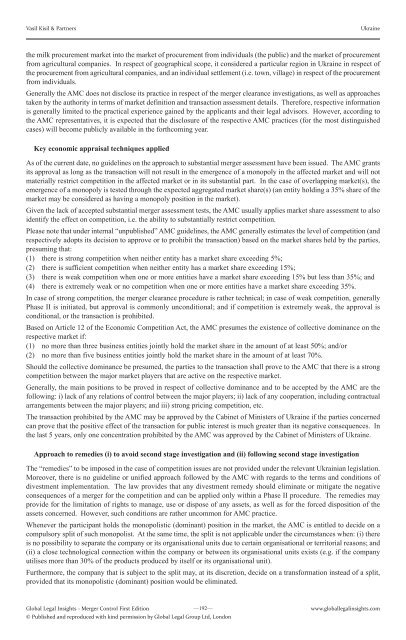Merger Controls First Edition - J Sagar Associates
Merger Controls First Edition - J Sagar Associates
Merger Controls First Edition - J Sagar Associates
Create successful ePaper yourself
Turn your PDF publications into a flip-book with our unique Google optimized e-Paper software.
Vasil Kisil & Partners Ukraine<br />
the milk procurement market into the market of procurement from individuals (the public) and the market of procurement<br />
from agricultural companies. In respect of geographical scope, it considered a particular region in Ukraine in respect of<br />
the procurement from agricultural companies, and an individual settlement (i.e. town, village) in respect of the procurement<br />
from individuals.<br />
Generally the AMC does not disclose its practice in respect of the merger clearance investigations, as well as approaches<br />
taken by the authority in terms of market definition and transaction assessment details. Therefore, respective information<br />
is generally limited to the practical experience gained by the applicants and their legal advisors. However, according to<br />
the AMC representatives, it is expected that the disclosure of the respective AMC practices (for the most distinguished<br />
cases) will become publicly available in the forthcoming year.<br />
Key economic appraisal techniques applied<br />
As of the current date, no guidelines on the approach to substantial merger assessment have been issued. The AMC grants<br />
its approval as long as the transaction will not result in the emergence of a monopoly in the affected market and will not<br />
materially restrict competition in the affected market or in its substantial part. In the case of overlapping market(s), the<br />
emergence of a monopoly is tested through the expected aggregated market share(s) (an entity holding a 35% share of the<br />
market may be considered as having a monopoly position in the market).<br />
Given the lack of accepted substantial merger assessment tests, the AMC usually applies market share assessment to also<br />
identify the effect on competition, i.e. the ability to substantially restrict competition.<br />
Please note that under internal “unpublished” AMC guidelines, the AMC generally estimates the level of competition (and<br />
respectively adopts its decision to approve or to prohibit the transaction) based on the market shares held by the parties,<br />
presuming that:<br />
(1) there is strong competition when neither entity has a market share exceeding 5%;<br />
(2) there is sufficient competition when neither entity has a market share exceeding 15%;<br />
(3) there is weak competition when one or more entities have a market share exceeding 15% but less than 35%; and<br />
(4) there is extremely weak or no competition when one or more entities have a market share exceeding 35%.<br />
In case of strong competition, the merger clearance procedure is rather technical; in case of weak competition, generally<br />
Phase II is initiated, but approval is commonly unconditional; and if competition is extremely weak, the approval is<br />
conditional, or the transaction is prohibited.<br />
Based on Article 12 of the Economic Competition Act, the AMC presumes the existence of collective dominance on the<br />
respective market if:<br />
(1) no more than three business entities jointly hold the market share in the amount of at least 50%; and/or<br />
(2) no more than five business entities jointly hold the market share in the amount of at least 70%.<br />
Should the collective dominance be presumed, the parties to the transaction shall prove to the AMC that there is a strong<br />
competition between the major market players that are active on the respective market.<br />
Generally, the main positions to be proved in respect of collective dominance and to be accepted by the AMC are the<br />
following: i) lack of any relations of control between the major players; ii) lack of any cooperation, including contractual<br />
arrangements between the major players; and iii) strong pricing competition, etc.<br />
The transaction prohibited by the AMC may be approved by the Cabinet of Ministers of Ukraine if the parties concerned<br />
can prove that the positive effect of the transaction for public interest is much greater than its negative consequences. In<br />
the last 5 years, only one concentration prohibited by the AMC was approved by the Cabinet of Ministers of Ukraine.<br />
Approach to remedies (i) to avoid second stage investigation and (ii) following second stage investigation<br />
The “remedies” to be imposed in the case of competition issues are not provided under the relevant Ukrainian legislation.<br />
Moreover, there is no guideline or unified approach followed by the AMC with regards to the terms and conditions of<br />
divestment implementation. The law provides that any divestment remedy should eliminate or mitigate the negative<br />
consequences of a merger for the competition and can be applied only within a Phase II procedure. The remedies may<br />
provide for the limitation of rights to manage, use or dispose of any assets, as well as for the forced disposition of the<br />
assets concerned. However, such conditions are rather uncommon for AMC practice.<br />
Whenever the participant holds the monopolistic (dominant) position in the market, the AMC is entitled to decide on a<br />
compulsory split of such monopolist. At the same time, the split is not applicable under the circumstances when: (i) there<br />
is no possibility to separate the company or its organisational units due to certain organisational or territorial reasons; and<br />
(ii) a close technological connection within the company or between its organisational units exists (e.g. if the company<br />
utilises more than 30% of the products produced by itself or its organisational unit).<br />
Furthermore, the company that is subject to the split may, at its discretion, decide on a transformation instead of a split,<br />
provided that its monopolistic (dominant) position would be eliminated.<br />
Global Legal Insights <strong>Merger</strong> Control <strong>First</strong> <strong>Edition</strong><br />
—192—<br />
© Published and reproduced with kind permission by Global Legal Group Ltd, London<br />
www.globallegalinsights.com


